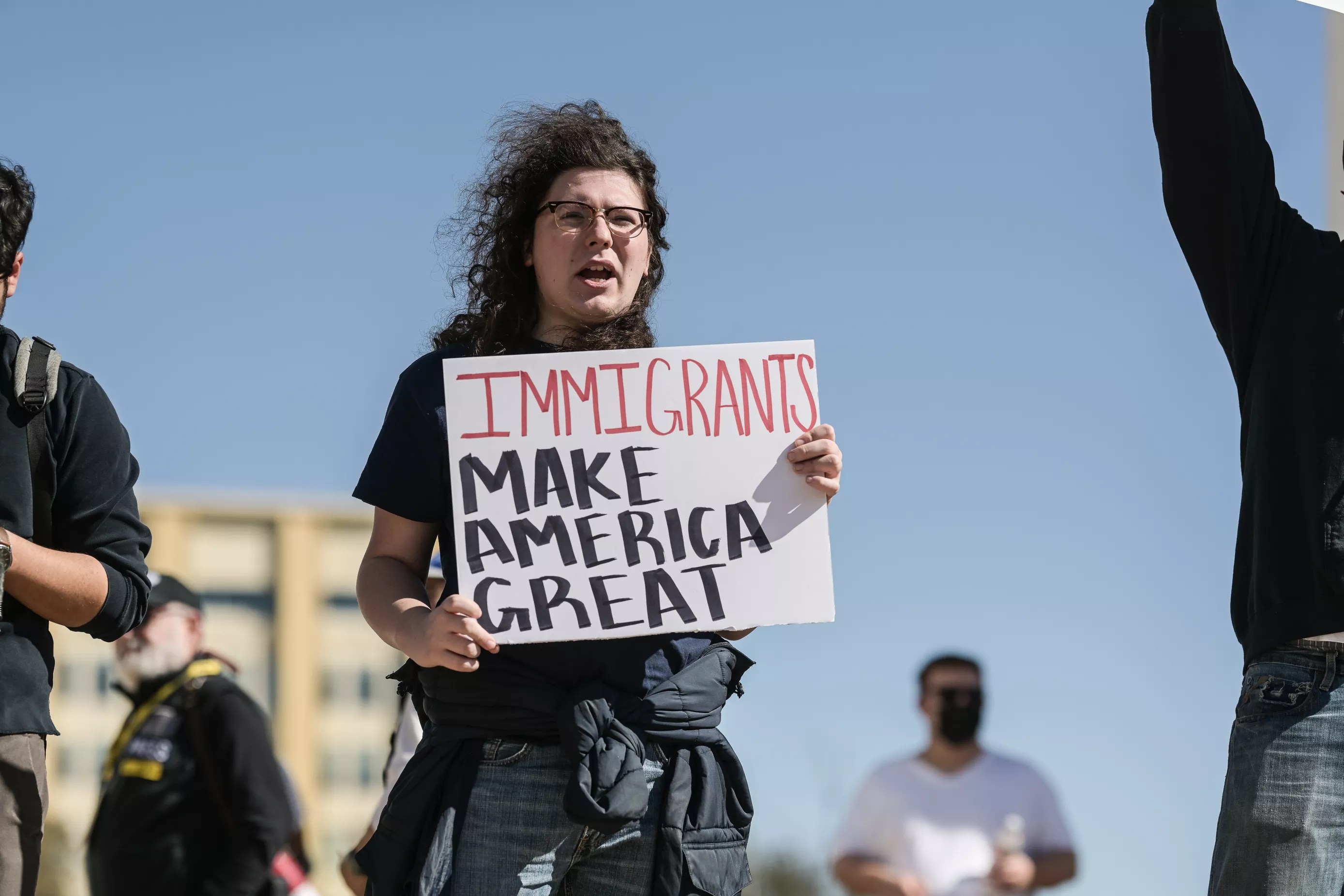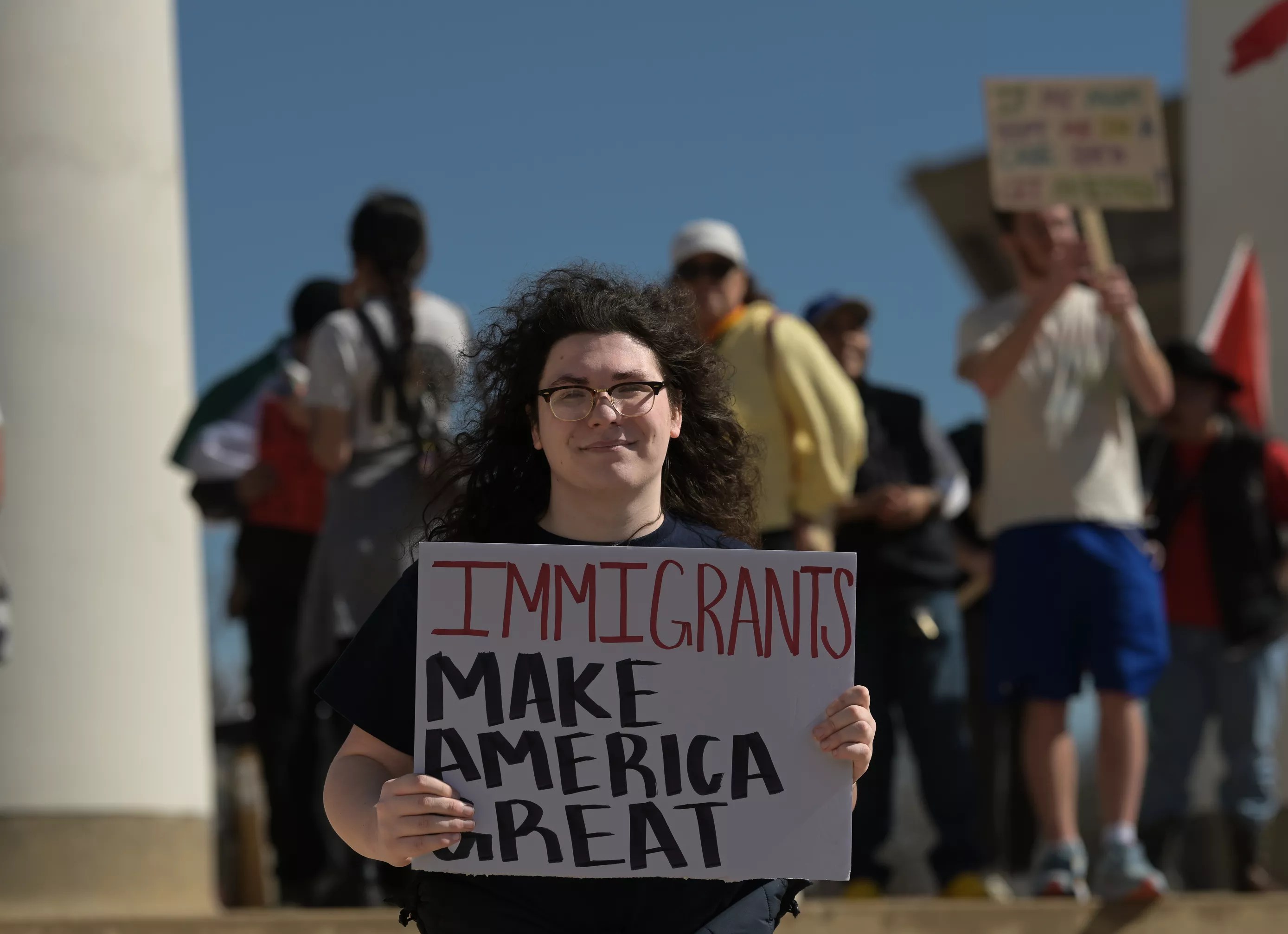
Mike Brooks

Audio By Carbonatix
Every day, Ben Wright wakes up and checks the mail to see if he’s going back to jail. It’s not just him, either. As of this writing, six students at the University of Texas at Dallas, where Wright teaches history, still face criminal trespassing charges related to last year’s protests over the war in Gaza. Wright and the students were arrested on UTD’s campus, and because of their bond conditions, the students are now forbidden from entering campus for any reason except attending classes.
“That means they can’t go to the library, they can’t go to the health center, they can’t attend the kind of club activities that are actually kind of mandatory if you want to pursue certain careers,” Wright tells the Observer. “So, really, the university has found a way to kill the career prospects for a few of its outspoken students, while publicly claiming neutrality, but actually, on a daily basis, continuing to inflict pain and suffering on students who were brave in speaking out against injustice.”
UTD did not respond to questions for this story, but its students’ plight is one of the more glaring examples of a fraught climate in Texas education.
“There’s a climate of fear of the consequences of speaking up,” says a UTD professor who asked the Observer not to use their name. This fall, after the protests, the professor says being on campus was “kind of surreal.”
This year, make your gift count –
Invest in local news that matters.
Our work is funded by readers like you who make voluntary gifts because they value our work and want to see it continue. Make a contribution today to help us reach our $30,000 goal!
“Everyone wanted to return to normal and act like nothing happened.”
But things are far from normal. A little over a year ago, Senate Bill 17 effectively wiped out all diversity, equity and inclusion (DEI) activities at public universities. Now, President Donald Trump’s new administration brings added pressures for professors like Wright, UTD students speaking out for Gaza and thousands of other vulnerable students across Texas. That includes Lillian Anderson, a University of Texas at Arlington student who recently came out as transgender.
“Ideally, we’d love to get our DEI program back,” Anderson says. “But at the very least, we’d like to stop more attacks from happening.”
Overcompliance
The current strain between government and higher education – as well as institutions and their students – has often been compared to the campus unrest of the 1960s, when students and professors across the country were disciplined for speaking out against the Vietnam War. The 1970 shooting at Kent State University, in which National Guard troops killed four students at an anti-war protest, is an infamous flashpoint in this conflict. Yet the government also attempted to quell the unrest in far more subtle ways, dispatching FBI agents to spy on students, discredit protest leaders and try to cause the firing of administrators deemed insufficiently tough on protesters.
Many universities have since built plaques or exhibits celebrating protest movements and student involvement, while at the same time adopting policies they believe will mollify unrest on campus. According to Inside Higher Ed, steps such as the “liberalization of graduation requirements,” the creation of co-ed dorms and “consultation with students about policy decisions” have been taken, in part, “to defuse or re-direct student protest.” Other, more recent rules have been more overt, limiting when and where students can protest and forbidding encampments like the one that resulted in arrests at UTD.
Multiple people interviewed for this story worry that these gradual efforts to limit protesting will have a larger effect than universities may realize.

Karrington Bennett of SMU questions where the next stop on her educational journey will be now that she questions the support available to her.
Mike Brooks
“Colleges are communities,” Thomas Saenz says. “What impacts one member impacts the entire community.”
Saenz is an attorney and the president of the Mexican American Legal Defense and Educational Fund. His organization is helping students understand their rights, and he wants universities to stand up for their students.
Saenz discussed how public universities can stand up to agencies like U.S. Immigration and Customs Enforcement amid the heightened threat of immigration raids.
“Even if there was a student that was targeted appropriately – which is unlikely – they can certainly plan their enforcement when that person is not on campus,” Saenz says. “The discussion with ICE needs to be, ‘The reason you should exercise your warrant off campus is to keep other students safe.'”
This would require ICE to contact the university ahead of time, and even if it does so, Saenz and many other people interviewed for this story worry about overcompliance: universities going out of their way (when prompted or not) to accommodate the Trump administration or the whims of Gov. Greg Abbott.
Multiple UTD students say overcompliance is already happening on their campus. For instance, the university closed its Office of Campus Resources and Support last spring, even after some students say they were told all SB17-related decisions had been made. As part of this move, the AccessAbility Resource Center, which offers disability and accessibility services, was moved to a different department. Students said that the level of support provided by the center has been significantly diminished by the move, in part because of a lack of staffing (20 people were fired when the university shuttered the Office of Campus Resources and Support).
In November, free speech organization PEN America called out the University of North Texas for what the group termed “extreme overcompliance” after more than 75 changes were reportedly made to the school’s courses to align with the state’s DEI ban.
Elsewhere, students at UTA lament the effect overcompliance has had on campus culture.
Anderson, a junior, says campus “feels deader than usual.” Annual events like the fall drag show are no longer happening, and student organizations like the Lavender Alliance, which promotes equity for the LGBTQIA+ community, have been forced to collect student dues to keep running because they no longer receive university funding.
“Now that there hasn’t been as many cultural events going on, it feels like the campus energy has been lost,” Anderson says.
This echoes something Wright said: “I’m doing a lot of student care and research work from home, not from the office.”
In other words, overcompliance has diminished the kind of activities that bring students and their supporters together on campus, which could worsen the already dire mental health crisis facing college students.
“Following SB17, not only have resources been dismantled, but the burden has been placed on students themselves to make up for that and support each other,” says Nora, a UTD student who asked to use a pseudonym. “We’re doing what we can, but we’re not professionals.”
Nora, who took part in the encampment on her campus, is also concerned about how the Trump administration will react to future student protests.
The president has previously advocated for violent crackdowns on protests, and in May 2024, when he was still a candidate, he addressed campus unrest in a meeting with a small group of donors. “If you get me elected,” he said, “we’re going to set that movement back 25 or 30 years.”
“The Best Protection Is Ourselves”
On a typically scorching Dallas day in August 2020, Karrington Bennett attended a protest on the campus of her new school. The aspiring lawyer had just transferred to SMU from Dallas College, and she joined the university’s Black Student Athletes as they wrote slogans on posters and marched for George Floyd and other lives taken by police brutality. On her poster, Bennett wrote the Bible verse Isaiah 1:17:
“Learn to do right; seek justice. Defend the oppressed.”
The protest was peaceful, and she was particularly encouraged by the appearance of SMU’s then-president, R. Gerald Turner, who spoke to the crowd and gave his support for its message.
“It was very magical to have that kind of support,” she says. Now, as she applies for law schools and once again considers SMU, Bennett is unsure if she’ll have that same kind of support. When Turner leaves his post, his successor will be Jay Hartzell, who held the president’s job at University of Texas at Austin during last year’s pro-Palestine protests. His university called the police on its students, and officers armed with riot gear arrested 57 protesters (charges against them were later dropped).
“Given the fact that the new president opposed protests on his campus, I don’t think that’s the same kind of initiative he’s supportive of,” says Bennett.
Less than five years after that protest at SMU – and after many universities espoused their commitment to fighting racism – Bennett is troubled by what she sees as an about-face in higher education. It’s left her thinking she’ll enroll in law school out of state, perhaps at a historically Black college or university.
“I know the universities’ hands are tied, in some ways,” she says. “But I want to be in an environment where my identity as a Black student is celebrated and embraced. For me, I’d rather risk the financial complications to prioritize my comfort and security.”
Bennett recognizes that moving away from home is an expensive choice many people would be unable to make, yet her hesitancy over where to enroll poses an important question about DEI backlash and its long-term effects.
The University of Texas system is vast and resourceful, and some of its institutions are brand names. What’s more, the system reported a slight increase in overall enrollment in fall 2023 and is attempting to entice more high schoolers by offering free tuition to any admitted student whose family makes less than $100,000 per year. But even if first-year enrollment is solid, retention, graduation and the overall student experience are different stories.
According to its own data, multiple UT system institutions have seen average or below-average retention rates and six-year graduation rates in recent years. Many factors inform data points like this, but the importance of sufficient support systems can’t be overstated.
Students who feel as if they don’t belong on campus are less likely to remain enrolled or graduate (perhaps explaining why universities are keen to tout the idea of “belonging” in the absence of substantive DEI programming). Belonging is especially important for first-generation students, who are more likely to remain enrolled, earn solid GPAs and have better mental and physical health if they feel like they belong on their campus.
Monse Navarrete was the first person in her family to graduate from college when she earned her degree from the University of Houston-Clear Lake in 2022. She is a beneficiary of the Deferred Action for Childhood Arrivals program, an immigration program commonly known by the acronym DACA that permits some undocumented immigrants brought to the U.S. as children to remain.
Even before SB17 took effect, Navarrete says there were many times she felt adrift, unsure of the resources available to her. Now that many of the cultural centers and inclusion programs designed for students like her have either been eliminated or dramatically reshaped to fit state law, she often thinks about DACA recipients who are enrolled in college right now. Because of compliance (or overcompliance) with SB17, those students have even fewer resources than she did.
“We usually don’t ask for help because we’re afraid to ‘out’ ourselves,” she says of DACA recipients. And like many students, she says, “at the end of the day, we know the best protection is ourselves.”
Anderson, the UTA student who came out as transgender in 2024, said something similar. Students on her campus are banding together in support of one another, whether that means pitching in dues for student organizations once supported by the institution or working together on a measure to keep the library open around the clock. Anderson says she’ll take any small wins she can get.
“It’s easy to think, ‘Oh, we only have 30 or so students here at this protest, and it’s a big school,'” she says. “But think about what it means for those 30 students.”
“A Denial Of Reality”
In late January, Ben Wright, the UTD professor, woke up and received some disheartening news. It wasn’t the court summons he’s been dreading; it was an announcement by the Trump administration that payments for federal grants and loans were being paused.
The pause, he says, “has potentially massive implications for higher ed. It’s still too early to tell exactly how serious this will be, but it’s safe to say that American research universities are dependent on federal grant dollars to support their essential work.”
The pause was eventually rescinded after roughly 24 hours of anxiety and confusion, but the message was clear: Trump wants to expand executive powers, and few American institutions are safe, especially those deemed too progressive. In fact, on the same day his administration rescinded the pause, Trump made good on a campaign threat against student protesters he erroneously cast as “Hamas sympathizers.”
“To all the resident aliens who joined in the pro-jihadist protests, we put you on notice: Come 2025, we will find you, and we will deport you,” Trump said as part of an executive order. “I will also quickly cancel the student visas of all Hamas sympathizers on college campuses, which have been infested with radicalism like never before.”
To Wright, these steps further complicate the future of public universities in Texas.
“Trying to read the mind of legislators is never something I’m interested in,” he says, “but it’s wise to not underestimate the number and power of folks who actually do want to destroy public education at every level. There are folks that believe public education is a social scourge that must be weakened, if not eradicated, and there’s no doubt this [SB17] will have the effect of weakening public education.”
That “weakening” takes many forms. It may mean universities are less hospitable for many students, who in turn struggle with their health in ways that may have been preventable. It can also mean talented people such as Bennett, the aspiring lawyer, decide to take their dollars and careers elsewhere.
“I love Texas,” says the UTD professor who asked to remain anonymous. “I feel more comfortable living in Dallas. … But the job? I don’t know about the job, long term.”

Lillian Anderson went off-campus to attend a recent protest against Donald Trump’s immigration policies.
Mike Brooks
What’s clear, at least to Wright and many others interviewed for this story, is that the current climate on campus is increasingly scary for many students.
It’s also clear that the future looks even scarier.
Terri Leo Wilson, a Republican state representative, has filed a bill that would eliminate in-state tuition for Texas students who don’t have legal documentation. And just a couple months ago, ahead of the new legislative session, the Texas Senate’s higher education subcommittee held a hearing examining public universities’ curriculums – specifically programs and certificates. The lawmakers were searching for more ways to snuff out what Lt. Gov. Dan Patrick has dubbed “discriminatory DEI policies.”
On top of all of that, Wright and the six students also have the criminal charges to worry about. On that front, they’re not getting much help from their university.
UTD’s faculty senate has twice voted in favor of asking the president to contact the Collin County District Attorney’s Office and request the charges be dropped. (After all, Wright reasons, the university requested the presence of state troopers on campus during last May’s protests.)
The president has yet to make that call.
“There’s a denial of that reality and a denial of the university’s role in that reality,” he says. “I hear things about how the university wants to ‘remain neutral,’ which doesn’t make sense in a situation they caused.”
By his estimate, the professor has spent about 300 hours talking, guiding or otherwise “looking after” the students who are facing legal fallout after last year’s encampment. One student was dealing with homelessness. Others were coping with “a tremendous amount of anxiety and mental health problems” from the trauma incurred from a night in jail. Further still, some students’ careers were jeopardized by the university’s briefly withholding degrees, and others continue to be jeopardized by the ban preventing students from accessing essential university services.
There are more hours of “looking after” still ahead, because Wright and his like-minded colleagues know someone has to check in on these students. For similar reasons, Monse Navarrete, the first-generation college student from Houston, has become an organizer with the immigrants’ rights organization United We Dream.
“Unfortunately, Texas seems to lay out the game plan for the rest of the country to follow,” she says. “But we have to keep reminding people we exist.”